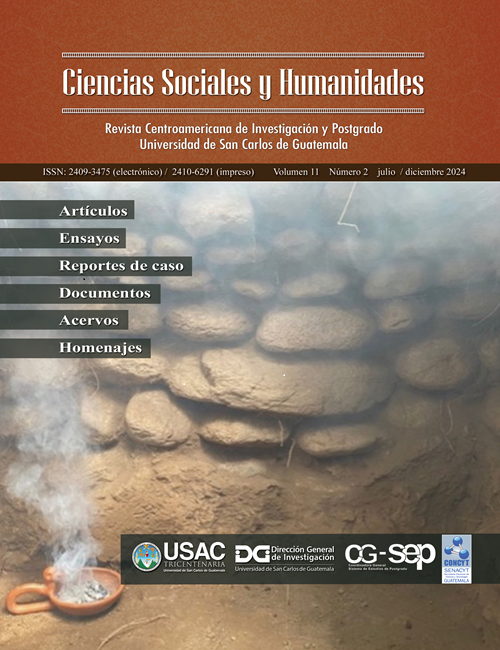Development of agroecological education modules through a participatory community research methodology in Chiquimula
DOI:
https://doi.org/10.36829/63CSH.v11i2.1727Keywords:
participatory research, agroecology, Indigenous knowledge, Ch'orti' Region, farmer-to-farmerAbstract
Participatory community research is a type of research that questions power relations in the production, distribution and recognition of knowledge. We present a case study that details the application of these methods, within the framework of a two-year project of an master's student from the University of Wisconsin-Madison, USA within four communities of the Ch'orti' Region of Guatemala focused on agroecological practices and the transfer of knowledge within and between communities. Starting with diagnostic information from Mancomunidad Copánch’orti’, a local partner organization, and the results of 39 interviews with members of the communities, common themes of interest emerged that informed two trainings and two farmer-to-farmer exchanges, and development of educational resources for the communities. We share the results of these activities and offer key strategies for collaborative projects.
Downloads
References
Altieri M. A. & Nicholls, C. I. (2017) Agroecology: a brief account of its origins and currents of thought in Latin America, Agroecology and Sustainable Food Systems, 41(3-4), 231-237. https://doi.org/10.1080/21683565.2017.1287147 DOI: https://doi.org/10.1080/21683565.2017.1287147
Bunch, R. (1995/1982). Two Ears of Corn: A Guide to People-Centered Agricultural Improvement. World Neighbors.
Bunch, R. (1998). People-centered agricultural development: Principles of extension for achieving long-term impact. En E. Lutz, H. P. Binswanger, P. Hazell, & A. McCalla (Eds.), Agriculture and the environment: Perspectives on sustainable rural development (pp. 145-155). The World Bank.
Cáceres, A. (2009). Vademécum nacional de plantas medicinales. Editorial Universitaria, Universidad de San Carlos de Guatemala.
Calderón, C. I. (2022). Reimagining our citational practices: Centering Indigenous and campesino ways of knowing. Teaching Citational Practice: Critical Feminist Approaches, 2, 43-54. https://journals.library.columbia.edu/index.php/citationalpractice/article/view/10025
Calderón, C. I., Jerónimo, C., Praun, A., Reyna, J., Santos Castillo, I. D., León, R., … Prado Córdova, J. P. (2018). Agroecology-based farming provides grounds for more resilient livelihoods among smallholders in Western Guatemala. Agroecology and Sustainable Food Systems, 42(10), 1128–1169. https://doi.org/10.1080/21683565.2018.1489933 DOI: https://doi.org/10.1080/21683565.2018.1489933
Copeland, N. (2018). Meeting peasants where they are: cultivating agroecological alternatives in neoliberal Guatemala. The Journal of Peasant Studies, 46(4), 831–852. https://doi.org/10.1080/03066150.2017.1410142 DOI: https://doi.org/10.1080/03066150.2017.1410142
da Cruz, C.G. (2018). Community-engaged scholarship: Toward a shared understanding of Practice. The Review of Higher Education, 41(2), 147-167. https://doi.org/10.1353/rhe.2018.0000. DOI: https://doi.org/10.1353/rhe.2018.0000
Fals-Borda, O. (1987). The application of participatory action-research in Latin America. International Sociology, 2(4), 329-347. https://doi.org/10.1177/026858098700200401 DOI: https://doi.org/10.1177/026858098700200401
Freire, P. (1969). Pedagogy of the oppressed (30th anniversary ed.). Continuum.
Fanzo, J., Haddad, L., Schneider, K. R., Béné, C., Covic, N. M., Guarin, A., Herforth, A. W., Herrero, M., Sumaila, U. R., Aburto, N. J., Amuyunzu-Nyamongo, M., Simon Barquera, M., Battersby, J., Beal, T., Bizzotto Molina, P., Brusset, E., Cafiero, C., Campeau, C., Caron, P.… Moncayo, J. R. 2021). Viewpoint: Rigorous monitoring is necessary to guide food system transformation in the countdown to the 2030 global goals. Food Policy, 104, 1-20. https://doi.org/10.1016/j.foodpol.2021.102163 DOI: https://doi.org/10.1016/j.foodpol.2021.102163
Gabay, M. (2023). Agroecology schools help communities restore degraded land in Guatemala. Mongabay Environmental News. https://news.mongabay.com/2023/07/agroecology-schools-help-communities-restore-degraded-land-in-guatemala/
Holt-Giménez, E. (2006). Campesino a Campesino: Voices from Latin America’s Farmer to Farmer Movement for Sustainable Agriculture. Food First Books.
Mancomunidad Copanch’orti’ (2019). Plan de desarrollo rural integral del territorio Maya Ch’orti’ 2019-2027. Mancomunidad Copanch’orti’
Metz, B. E., McNeil, C. L., & Hull, K. M. (2009). Ch'orti Maya Area: Past and Present DOI: https://doi.org/10.5744/florida/9780813033310.001.0001
University Press of Florida.
Piniero, M., Pezo, D., & Cruz, J. (2006). Un mejor manejo del ganado en Guatemala. Leisa, 22(3), 32-34.
Rice, A. M., Einbinder, N., & Calderón, C. I. (2022). ‘With agroecology, we can defend ourselves’: examining campesino resilience and economic solidarity during pandemic-era economic shock in Guatemala. Agroecology and Sustainable Food Systems, 47(2), 273-305. https://doi.org/10.1080/21683565.2022.2140378 DOI: https://doi.org/10.1080/21683565.2022.2140378
Smith, L.T. (1999). Decolonizing methodologies: Research and indigenous peoples. University of Otago Press.
Thorp, H.H. (2024). Learning with Lakota scientists. Science, 385(6713), 1025-1025. https://doi.org/10.1126/science.ads7901 DOI: https://doi.org/10.1126/science.ads7901
Tuck, E. & Yang, K.W. (2014). R-words: Refusing research. En D. Paris & M. T. Winn (Eds.), Humanizing research: Decolonizing qualitative inquiry with youth and communities (pp. 223-248). Sage Publications. https://doi.org/10.4135/9781544329611.n12 DOI: https://doi.org/10.4135/9781544329611.n12
Vásquez Bianchi, C. (2023a, 8 de junio). The Importance of Medicinal Plants in Chiquimula, Guatemala. [Video]. YouTube. https://www.youtube.com/watch?v=rJo8rz7zGB0
Vásquez Bianchi, C. (2023b, 8 de junio). Soil Conservation Practices in Chiquimula, Guatemala. [Video]. YouTube. https://www.youtube.com/watch?v=Qq5lj44-974
Downloads
Published
How to Cite
Issue
Section
License
Copyright (c) 2024 Margaret Baker, Claudia I. Calderón

This work is licensed under a Creative Commons Attribution-NonCommercial-ShareAlike 4.0 International License.
El autor que publique en esta revista acepta las siguientes condiciones:
- El autor otorga a la Dirección General de Investigación el derecho de editar, reproducir, publicar y difundir el manuscrito en forma impresa o electrónica en la revista Ciencias Sociales y Humanidades.
- La Direción General de Investigación otorgará a la obra una licencia Creative Commons Atribución-NoComercial-CompartirIgual 4.0 Internacional.










